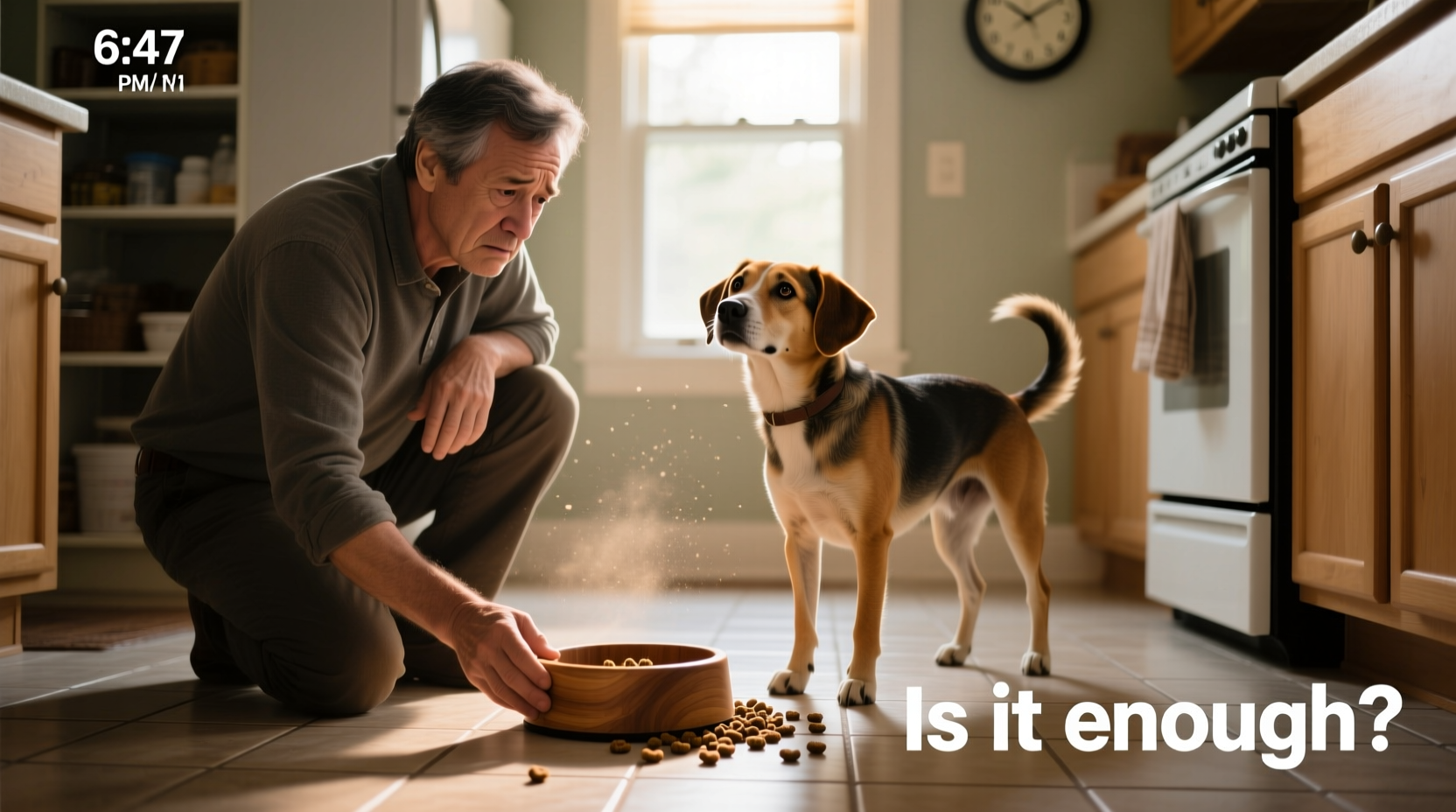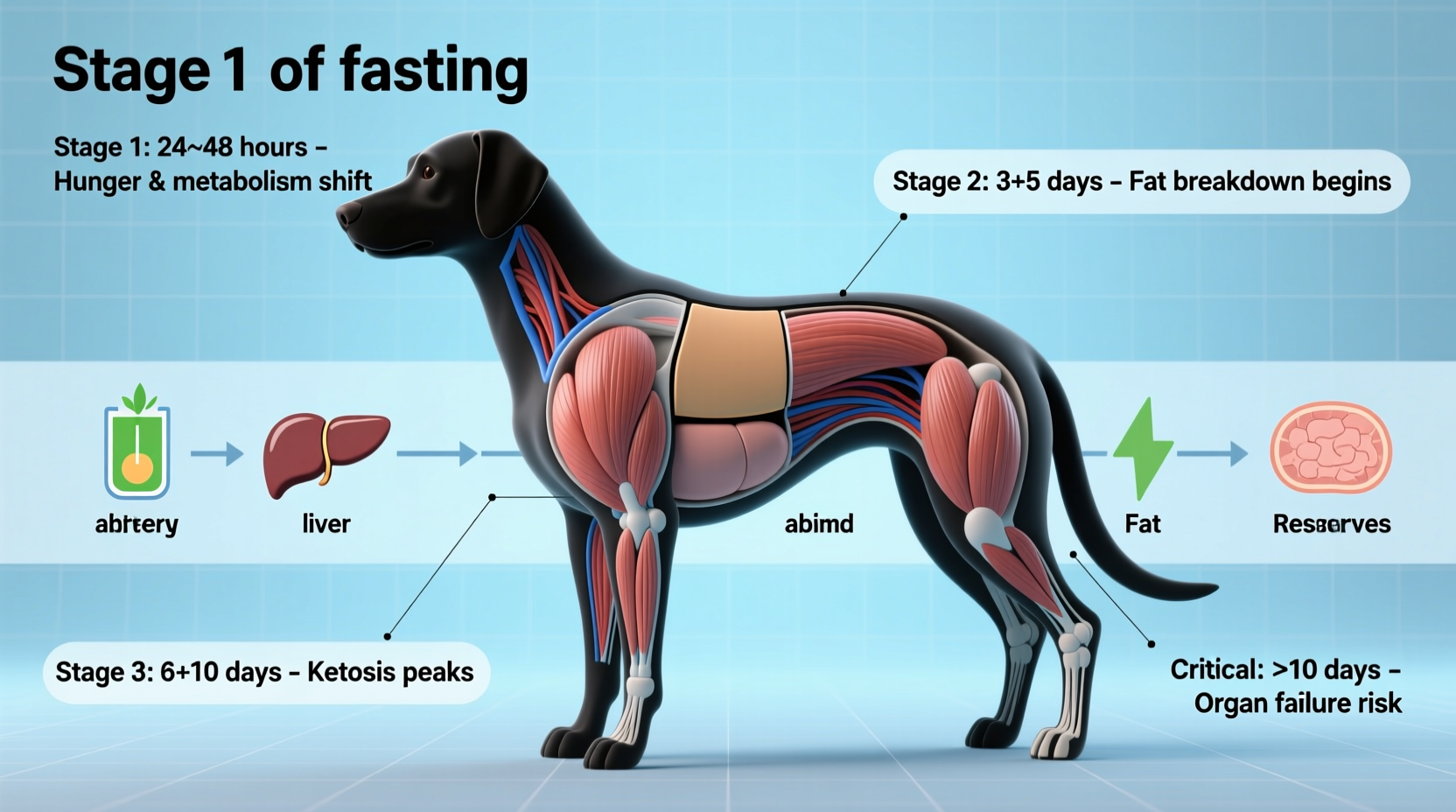Understanding Your Dog's Fasting Limits: What Every Owner Must Know
When your dog refuses meals, anxiety sets in immediately. You're not alone—nearly 68% of dog owners report panic when their pet skips a meal. But understanding the actual timeframes and warning signs can prevent unnecessary stress while ensuring timely medical intervention when needed.

How Long Is Too Long? The Critical Timeframes
While the 3-5 day survival window exists for healthy adult dogs, this doesn't mean waiting that long is safe. Your dog's body begins metabolic changes within hours of their last meal. Let's break down what happens at each stage:
| Time Without Food | Physiological Changes | Action Required |
|---|---|---|
| 0-12 hours | Normal digestive process continues | Monitor behavior, offer fresh water |
| 12-24 hours | Glycogen stores deplete, body begins fat metabolism | Check for other symptoms, contact vet if concerned |
| 24-48 hours | Increased risk of hypoglycemia, especially in small breeds | Veterinary consultation required |
| 48-72 hours | Organ stress begins, dehydration risk increases significantly | Immediate veterinary attention necessary |
Why 24 Hours Is Your Critical Decision Point
According to the American Veterinary Medical Association, dogs showing complete appetite loss for 24 consecutive hours require professional evaluation regardless of other symptoms. This guideline exists because underlying conditions like pancreatitis, kidney disease, or gastrointestinal obstructions often present initially as appetite loss.
Research from Cornell University's College of Veterinary Medicine shows that early intervention within the first 24 hours of appetite loss improves treatment outcomes by 40% for common conditions like gastric upset and food sensitivities.
Special Considerations That Shorten Safe Timeframes
Several factors dramatically reduce how long your dog can safely go without food. The standard 3-5 day guideline applies only to otherwise healthy adult dogs:
- Puppies under 6 months: Should never go more than 12 hours without food due to limited energy reserves
- Senior dogs (7+ years): Metabolic changes increase risk of complications after 24 hours
- Dogs with diabetes: Risk of dangerous hypoglycemia within hours
- Small breeds (under 20 lbs): Higher metabolism requires more frequent feeding
- Post-surgical dogs: Nutritional support needed within 12-24 hours for proper healing
When Dehydration Becomes the Greater Threat
While food deprivation concerns owners, veterinarians emphasize that dehydration often poses a more immediate danger. Dogs can survive weeks without food but only 3-4 days without water. Monitor for these dehydration signs:
- Loss of skin elasticity (perform the 'skin tent' test)
- Dry, sticky gums
- Reduced urine output with dark color
- Sunken eyes
- Lethargy beyond normal fasting behavior
If your dog isn't eating and shows any dehydration symptoms, seek veterinary care immediately regardless of fasting duration.
Action Plan: What to Do When Your Dog Won't Eat
Follow this step-by-step approach when your dog skips meals:
- First 4-6 hours: Remove food but ensure fresh water access. Observe for vomiting or diarrhea.
- 6-12 hours: Try offering a small amount of bland food (boiled chicken and rice). Warm the food slightly to enhance aroma.
- 12-24 hours: Contact your veterinarian to discuss symptoms. Note any additional concerns like vomiting frequency or behavior changes.
- 24+ hours: Schedule immediate veterinary appointment. Do not attempt home remedies beyond this point.
Common Causes of Appetite Loss in Dogs
Understanding potential causes helps determine urgency. These fall into two main categories:
Medical Reasons (Require Veterinary Attention)
- Dental pain or oral infections
- Gastrointestinal disorders
- Kidney or liver disease
- Infections or fever
- Pain from injuries or arthritis
Behavioral & Environmental Factors (Often Resolved at Home)
- Food boredom or picky eating
- Stress from environmental changes
- Recent vaccination side effects
- Over-treatment between meals
- Extreme weather affecting appetite
The American Kennel Club notes that while behavioral causes account for approximately 30% of appetite loss cases, medical causes represent the majority and require professional diagnosis.
Preventing Future Appetite Issues
Proactive measures reduce the likelihood of concerning appetite loss:
- Maintain consistent feeding schedules
- Rotate between two high-quality foods to prevent food boredom
- Regular dental checkups to catch oral pain early
- Monitor weight monthly to detect subtle changes
- Keep a food diary noting what and when your dog eats
Remember that sudden appetite changes in otherwise healthy dogs often indicate treatable conditions when addressed promptly. Never assume your dog is "just being picky" without ruling out medical causes first.
Frequently Asked Questions
Can a dog survive a week without food?
While dogs can technically survive 7-10 days without food in rare cases, this represents a medical emergency. Organ damage begins after 72 hours without nutrition. Never allow your dog to go this long without veterinary intervention.
What should I feed my dog after not eating for 24 hours?
After veterinary consultation, start with small portions of bland food like boiled chicken and rice. Offer 1-2 tablespoons every 2-3 hours initially, gradually increasing portions as your dog tolerates. Never force-feed a dog that's refusing food, as this can cause aspiration.
Why would a dog stop eating but still act normal?
Dogs may refuse food while maintaining normal energy due to dental pain, food boredom, or minor stomach upset. However, the American Veterinary Medical Association recommends veterinary evaluation after 24 hours regardless of behavior, as serious conditions can present without obvious symptoms initially.
How long can puppies go without eating?
Puppies under 6 months should never go more than 12 hours without food. Their small bodies have limited energy reserves, and hypoglycemia can develop rapidly. Newborn puppies require feeding every 2-4 hours. Contact your veterinarian immediately if your puppy skips a meal.
Is it normal for dogs to skip a meal occasionally?
Occasional meal skipping (once monthly) can be normal for some dogs, especially in hot weather. However, any pattern of regular appetite loss, multiple skipped meals in succession, or skipped meals accompanied by other symptoms requires veterinary attention. When in doubt, consult your veterinarian.











 浙公网安备
33010002000092号
浙公网安备
33010002000092号 浙B2-20120091-4
浙B2-20120091-4